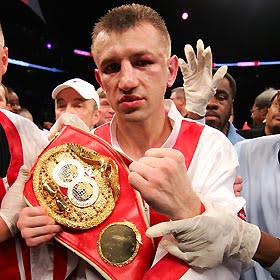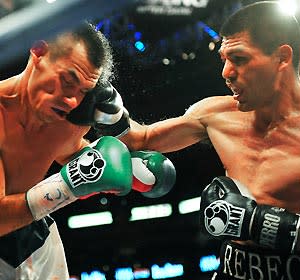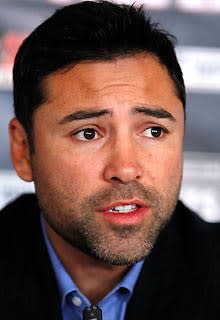Boxing's big fight is with tough economic times
You can follow Kevin Iole on Twitter at @KevinI
Kathy Duva examined her business one day not long ago and realized her company had lost its way. Main Events, which her late husband's family had founded a little more than 30 years ago, was losing its place in the 21st century.
From the mid-1970s through the early years of the 21st century, Main Events had been one of boxing's most successful promoters, developing elite fighters and popular personalities such as Evander Holyfield, Pernell Whitaker, Arturo Gatti and Fernando Vargas.
It was a family-owned business that began promoting boxing cards at Ice World in Totowa, N.J., in the late 1970s. Dan Duva, Kathy's late husband, was the CEO. Kathy handled marketing. Dan's father, Lou, trained most of its fighters. Dan's brother, Dino Duva, played a major role in the business.
Its niche was competitive shows with a premium on scrappy fighters who made for crowd-pleasing matches. Soon, Main Events landed television coverage for its shows, and boxers like Mike McCallum, Bobby Czyz, Vinny Pazienza (now Paz), Johnny "Bump City" Bumphus and Livingstone Bramble won world titles and became top-of-the-card draws.
Dan Duva died of a brain tumor in 1996 and Kathy Duva assumed her husband's role as the company's CEO. But it was around that time that fundamental changes in the sport were occurring.
Dates on network and basic cable television all but dried up by the early 1990s and premium cable channels such as HBO and Showtime were becoming the only consistently reliable source of revenue for promoters. A large majority of boxing promoters essentially ceased promoting and became glorified television packagers, negotiating deals for dates on HBO and/or Showtime. They quit worrying about selling tickets and sponsorships and became content in simply taking the profit left over from the television money after paying the fighters.
It was a way to make money, but it wasn't a way to develop fighters into recognizable, ticket-selling personalities and, thus, it wasn't a sustainable business. Without fighters in demand, the promoters would cease to exist.
It also became harder for promoters other than Golden Boy because HBO gave Golden Boy an output deal that guaranteed dates on the network without fights. No other promoter has that and it gives Golden Boy an inordinate advantage in the marketplace.
For a while, Duva continued to play the game at which her company had once excelled. As the 21st century began, she'd kept a large roster of fighters under promotional contract and would have to get them bouts. Because television dates had become so scarce and the premium cable channels aren't particularly interested in young fighters with losses, she had to try to guarantee her undercard boxers wins in order to protect their future earnings.
It wasn't hard to get them those wins, but the side effect was that it led to one-sided mismatches which were unappealing to fans and in which it was routinely possible to pick 95 percent of the results accurately. The long-term impact of doing that for boxing promoters was evident at the May 1 pay-per-view card in Las Vegas between Floyd Mayweather Jr. and Shane Mosley. Less than a half-hour before the main event, 75 percent of the seats were empty and the MGM Grand Garden Arena didn't fill until mere moments before the fight began.
And that scenario, which has been repeated so frequently in the past 15 years, didn't sit well with Kathy Duva. But she didn't opt to abandon the business. She knew how to promote and decided that it was the new system, not her company, which was broken.
Fighters who had never developed any kind of a following were demanding six- or seven-figure purses. It was economic suicide to pay a boxer $750,000 when he'd generate less than $250,000 in revenue, but that is what boxing had become as many promoters chased television dollars at the expense of promoting their shows.
Duva decided to start over. She thinned out her roster to just a handful of fighters and opted to go back to the old way of doing things. Her fighters would compete frequently, always against tough opposition, and would not be guaranteed outrageous sums just to appear. They could make a lot of money, but it would only be by selling tickets and attracting a following. They would paid for performance and ticket-selling capability, not for potential.
Main Events has promotional contracts with heavyweight Tomasz Adamek, super welterweight Joel Julio and super lightweight Zab Judah. Each of the men has bought into Duva's concept, in essence becoming her partners.
Adamek fights Michael Grant in a pay-per-view show Saturday at the Prudential Center in Newark, N.J. It will be Adamek's first bout since an April 24 victory over Chris Arreola in Ontario, Calif., on HBO – a fight that announced his arrival as a top-level heavyweight.
According to the California State Athletic Commission, Adamek was paid $100,000 for appearing on that HBO card. On Saturday, his purse will be determined by the revenues the fight generates. Adamek is enormously popular in Poland, his homeland, and Main Events has been able to secure a large amount of television money from a Polish network.
The company has worked diligently to promote Adamek in the Polish community in the U.S., and Adamek regularly draws crowds in excess of 10,000 to the Prudential Center.
"He'll probably make more money from this fight than he did by fighting Arreola on HBO," she said.
Boxing has been hamstrung by insane salary demands by fighters. For every fighter like Mayweather or Manny Pacquiao, who sells tickets, attracts sponsors and racks up the pay-per-view sales, there are thousands who do none of those things.
Alfredo Angulo is an exciting fighter who has yet to establish himself as a ticket seller. He last fought on the opener of an HBO doubleheader in Rancho Mirage, Calif., in which promoters struggled mightily to sell 1,800 tickets.
Angulo stopped Joachim Alcine in the first round July 17 to raise his record to 19-1 and was soon after offered $750,000 to fight middleweight champion Sergio Martinez. Most experts viewed it as an exceptionally generous offer, particularly since he could drop back to super welterweight and remain No. 1 contender in that division if he lost and HBO was offering him a comeback fight on its air.
Yet, Angulo turned it down. It would have been a bad move in any economic climate, but in a recession in which the best promoters are barely surviving and the others are going under, it was insanity.
"I'm puzzled by why they don't get that the opportunities are dwindling in number and in economic significance," promoter Lou DiBella said. "Part of the problem is that there are managers who are good and who understand the game. But there are a lot more managers who are uninformed or dishonorable and then there are the least desirable who are uninformed and dishonorable."
Angulo's manager, Mike Criscio, said the total package HBO offered Shaw for Angulo's service was $1 million. He said he proposed to Angulo to accept $850,000 and let Shaw keep the remaining $150,000 to cover expenses and as profit.
Angulo, though, told Criscio he would not fight for less than $900,000 and the fight did not get made.
"There aren't a lot of guys out there, if any, with 20 fights who are making $1 million," said Criscio, a former police officer who also manages light heavyweight Chad Dawson. "Alfredo is one of the more feared and fierce guys in boxing today. Do I think he deserves more than $750,000? [Expletive] yeah, I do. But the thing is, it's not like there is a lot else out there.
"I advised him to take it. If he had, he would have had been one of the only guys to fight on HBO three times in a year, and he would have made a lot of money. Now, they are basically saying to him, 'OK, see you next year,' and they'll find someone else to take the fight, probably for less."
Angulo, though, is not alone in making such decisions. Bradley is one of the elite fighters in the world, but his public appeal doesn't match his talent. He was paid $750,000 to fight in the main event of the July 17 card he shared with Angulo. In his hometown, he could barely sell out a tiny venue.
Gary Shaw promotes Bradley and Angulo and knows all too well of the difficult marketplace. In countries like Canada and throughout Europe and Asia, boxing does big business. Lucian Bute is a major star in Canada and regularly attracts large, enthusiastic crowds and blue-chip sponsors to his fights in Montreal's Bell Centre. The same is true of heavyweight champions Wladimir and Vitali Klitschko, who are based in Germany. Ricky Hatton was a similar draw in Manchester, England, where he had a maniacal local backing. And super middleweight champion Mikkel Kessler is a rock star in his native Denmark.
In the U.S., though, only Pacquiao and Mayweather have that kind of status, yet so many boxers want to be paid like they do sell.
"There are financial hardships now and ticket sales have slowed, not just in the boxing business but in concert promotions, too," Golden Boy's Richard Schaefer said. "The revenue streams aren't what they were a couple of years ago, but the expenses are still the same. Economically, it's a different world now than it was five years ago, three years ago, even two years ago."
Schaefer noted that there are fighters who signed long-term contracts several years ago which guarantees them minimum amounts of money that promoters are unable to pay now. As a result, the fighters can either sit on the sidelines and await an offer for their contract minimum or opt to stay active and fight for less.
Many fighters sit out, which then hurts the sport by frustrating fans who want to see the best fights made.
Duva made a unique deal with her undercard fighters, none of whom she has under contract anymore. She does a partnership deal with them and requires them to face difficult opponents and to sell tickets.
Shem Pagan, a super lightweight from Brooklyn, will make his pro debut on the Adamek-Grant undercard on Saturday. He and his manager, Ira Kaufman, clearly have bought into Duva's thinking.
Pagan, a five-time New York Golden Gloves champion, has already sold more than $6,200 worth of tickets himself. Kaufman took out an ad for him in the New York Post. He held his own news conference in New York to hype the fight.
Instead of the Prudential Center being dead when Pagan fights, as it was for the early fights on the Mayweather-Mosley card, it will be filled with cheering fans.
"I see these fighters who want all of this money and are demanding so much, and they don't sell tickets," Kaufman said. "We have gone out and created a market for Shem. We created a Facebook fan page and we used that to generate sales. We allowed fans to choose Shem's nickname, and they came up with 'The Chosen One.' We got out and took advantage of all the social media tools that are out there.
"There will be people who are going to this card just to see Shem, but they'll see a good night of fights other than just Shem's fight. The way it is in boxing now, the fans just show up for the main event, a half-hour or 45 minutes. But it should be an event, a whole night of fights. If you go to the horse races, you don't show up just for the Preakness or the Kentucky Derby, you show up for all of the races. The way Kathy is doing things, she's bringing the fans out for all of the fights, and that's going to create more fans of these fighters who are on their way up."
Duva said the old way of business doesn't work. She said HBO and Golden Boy have a very close relationship and that HBO often attempts to steer boxers to Golden Boy. She said she is aware that someone attempted to set up a meeting between Adamek and Schaefer in Chicago late last year, though Adamek chose not to attend.
Duva said she believes if she develops a young star, he'll be scooped up by Golden Boy at the time he's ready to fight on HBO.
"Golden Boy is out there poaching all of these young fighters," she said. "Even on the pay-per-view card they just had, Main Events or someone else developed all those fights. But now, there is a huge disincentive to building these young fighters when you know what is going to happen."
She knows she'll lose some fighters, fairly or unfairly, and accepts that as part of the business. Promoters, she said, will continue to be necessary in order to develop viable opponents for the stars to fight.
The heavyweight division is perceived to be so bad because no one has done a good job of building potential challengers for the Klitschko brothers. When Main Events had Holyfield and Lennox Lewis, she said it invested significantly in the heavyweight division to build recognizable opponents that would be accepted as viable challengers.
Now, she's just looking to put on solid arena shows that entertain the crowds. She wants to partner with fighters who buy into her concept and are willing to put in the effort to help themselves.
"I'd rather do a great job with a few guys than a crappy job with a lot of them," Duva said. "We know how to promote. We have proven that. So we'll find guys who want to buy into our program and we'll work hard for them and we'll make them a lot of money, and we'll put on a lot of great fights cards in the process."



